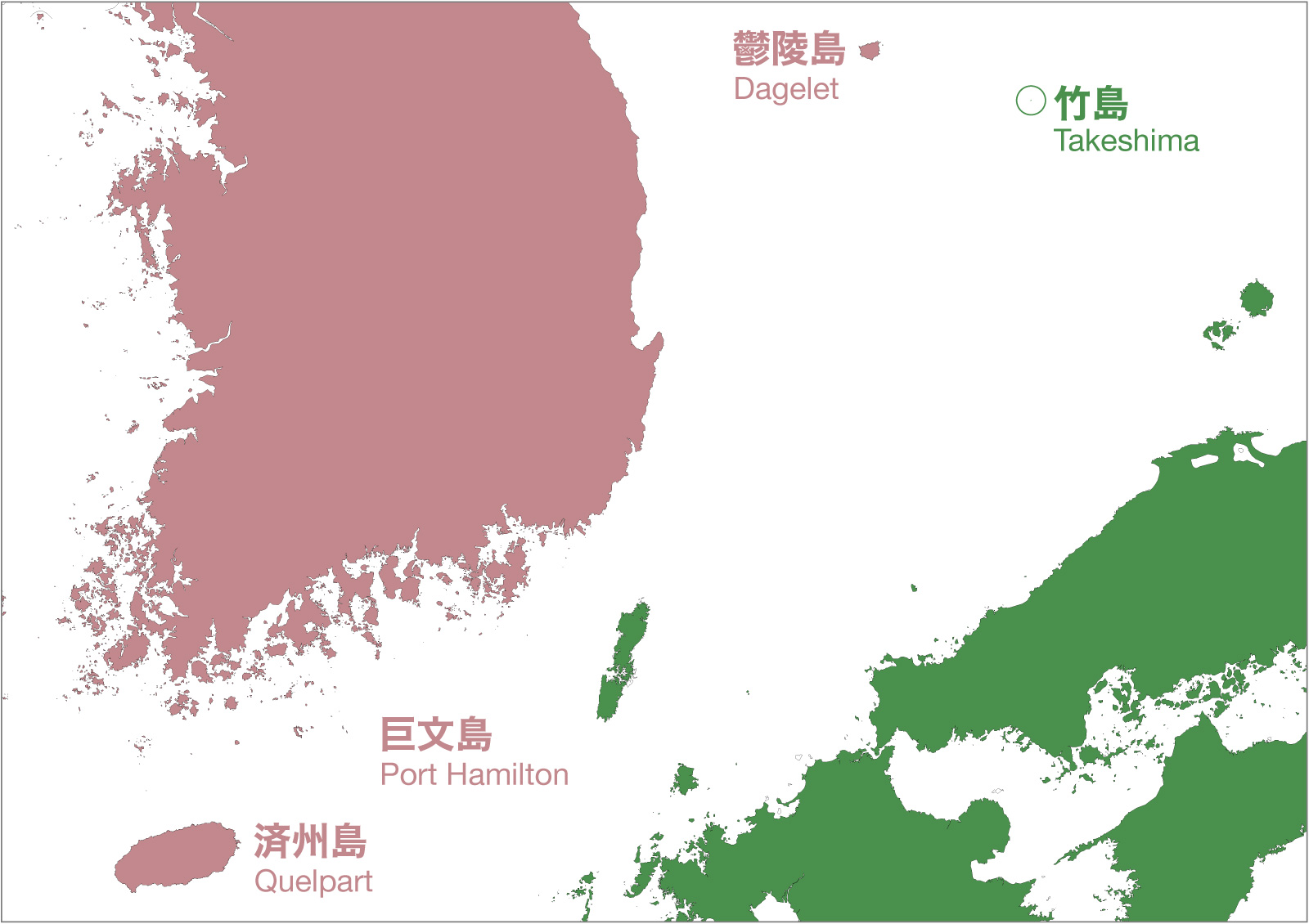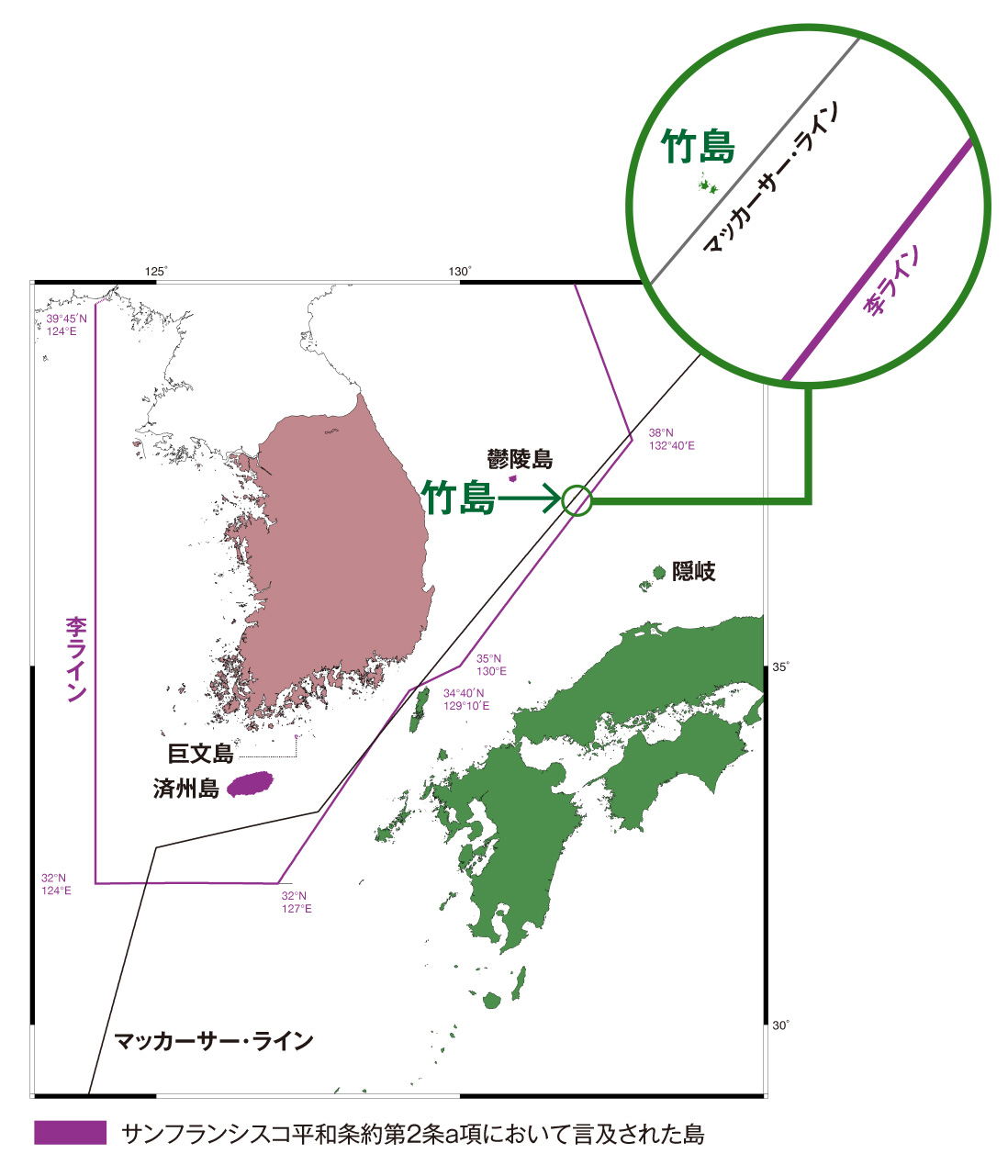平和条約署名、李承晩ライン
1951年9月8日
サンフランシスコ平和条約署名
本州、北海道、九州、四国以外の日本の島嶼が決定した。
サンフランシスコ平和条約
第二章(領域)
第二条
(a) 日本国は、朝鮮の独立を承認して、済州島、巨文島及び欝陵島を含む朝鮮に対するすべての権利、権原及び請求権を放棄する。

韓国の動き
海洋主権宣言に対する米国の抗議
米国は韓国に対し、韓国の海洋主権宣言がすべての国に認められる公海上の権利を侵害することになるとの深い懸念を示しつつ、このような宣言が認められるのであれば、どの国でも一方的に宣言を発出することで公海を領海に転換することが可能になってしまう等指摘した。
米国の抗議
資料抜粋(日本語)
No. 167
American Embassy,
Pusan, February 11, 1952.
Excellency:
I have the honor to advise Your Excellency that the Government of the United States of America has taken note of the Proclamation issued by the President of the Republic of Korea on January 18, 1952 regarding Korean sovereignty over the continental shelves and certain water areas adjacent to the mainland and insular coasts of the Republic of Korea.
I am directed to inform Your Excellency that the Government of the United States of America regards with deep concern the provisions of this Proclamation. If carried into execution, this Proclamation would bring within the exclusive jurisdiction and control of the Republic of Korea wide ocean areas which have hitherto been regarded as high seas by all nations, and would in these waters and in the air spaces above supplant the free and untrammeled navigation of foreign vessels and aircraft bb such controls as the Republic of Korea, in the exercise of the sovereignty claimed, might apply. The disclaimer in Paragraph 4 does not lessen the concern of the United States Government since by the assertion of sovereignty, freedom of navigation in these areas might be claimed to be a Privilege granted b [sic] the Republic of Korea rather than a right deriving from international law.
Although the Proclamation purports to be supported by well-established international precedents, my Government is not aware of any accepted principle of international law which would qualify as a legitimate precedent for this purported extension of Korean sovereignty. In this regard, my Government wishes to call to the attention of the Republic of Korea, that, unlike the two Proclamations issued by the President of the United States of America on September 28, 1945 concerning United States policy with respect to the resources of the continental shelf and the conservation of contiguous high seas fisheries, the Korean Proclamation relates to Korean national sovereignty over the areas specified therein. The two United States Proclamations did not contemplate, nor in fact effect, any extension of the pre-existing territorial waters of the United States. On the contrary, the one has specific reference to the natural resources of the subsoil and sea bed rather than to the subsoil and sea bed so, while the other relates only to the maintenance of the productivity of the fishery resources in contiguous high seas and provides for joint action where one or more other states also have an interest in a fishery to be conserved.
With the foregoing considerations in mind, the Government of the United States of America desires to inform the Government of the Republic of Korea that it reserves all its interests and the interests of its nationals and vessels under the provisions of the Korean Proclamation in question, and under any measures designed to carry them into execution.
Accept, Excellency, the renewed assurances of my most distinguished consideration.
His Excellency
Yung-tai Pyun,
Minister of Foreign Affairs,
Republic of Korea.
MEMORANDUM
Part I: The United Government is very much interested in seeing
a just and equitable settlement of the fishing problem and the other out-
standing problems between Japan and Korea but believes that this is primarily a matter to be worked out between the two countries in the forthcoming negotiations. It is hoped that moderation on both sides and recognition of the community of interest between the two nations will lead to an equitable settlement.
Part II: The following is relevant international law and other background material.
1. The term “national sovereignty” denotes complete jurisdiction for
all purposes.
2. The term “territorial waters” is derived from the fact that the
littoral state has sovereignty over it. This distinguishes territorial
waters from the high seas over which no nation has sovereignty.
3. Despite the Republic of Korea disclaimer, the Republic of Korea
Proclamation is in effect equivalent to the claim that any nation can,
by proclamation, convert the high seas into territorial waters.
(text omitted)
1952年(昭和27年)2月11日 所蔵:韓国外交史料館
|竹島トップ|







